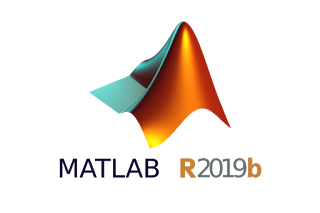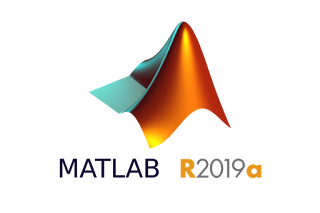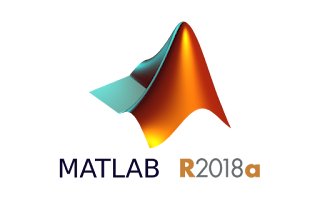
Matlab 2019b (MATLAB 9.7, R2019b) introduced on 17 Sep 2019. The release contains new products in support of robotics, new training resources for event-based modeling, and updates and bug fixes across the MATLAB and Simulink product families.
What’s new in Matlab 2019b
Environment
- Live Editor Tasks: Add interactive tasks to live scripts to explore parameters and automatically generate code- Live Editor Output: Animate plots to show changes in data over time
- Live Editor Output: Adjust the width of columns in tables
- Live Editor Output: Scroll through and copy data in arrays such as cell arrays, object arrays, and struct arrays
- Live Editor Export: Customize figure format as well as document paper size, orientation, and margins when exporting
- Live Editor Code: Duplicate one or more lines of code
- Live Editor Code: Suppress Code Analyzer warning messages
- Live Editor Debugging: Set breakpoints for anonymous functions
- Live Editor Internationalization: Add non-English language such as Chinese, Japanese, and Korean characters on Windows and macOS Platforms
- Add-On Manager: Update MATLAB and other installed add-ons
- Add-On Manager: Programmatically manage add-ons by name
- Settings: Create persistent settings for custom apps, toolboxes, and across MATLAB sessions
- MATLAB Drive: Share folders and collaborate with others
Functionality being removed or changed
Language and Programming
- size Function: Find lengths of multiple array dimensions at a time- matches Function: Determine if input strings are equal
- Hexadecimal and Binary Numbers: Specify numbers using hexadecimal and binary literals
- Indexing: Use dot indexing into function calls
- System object authoring improvements: Property validation support and simplified class inheritance
- Function Input Arguments: Declare function input arguments to restrict values
- namedargs2cell Function: Convert structure containing name-value pairs to cell array
- delete, dir, isfile, isfolder, and what Functions: Access web-based storage services like Amazon Web Services and Azure Blob Storage
- Suggested Corrections: Correct errors with two new classes
- error Function: Provide suggested fix for uncaught exception
Functionality being removed or changed
Data Analysis
- Live Editor Tasks: Interactively preprocess data and generate code- groupfilter Function: Filter data in a table, timetable, or matrix by group
- datetime Data Type: Detect formats with fractional seconds when converting text that represents dates and times
- table and timetable Data Types: Variable names can have any characters, including spaces and non-ASCII characters
- tall Arrays: Operate on tall arrays with more functions, including setdiff, xcorr, and outerjoin
- tall Arrays: Avoid running out of memory due to temporary copies of data
Data Import and Export
- detectImportOptions Function: Specify the type of import options for delimited or fixed-width text files- table and timetable Data Types: Read and write tabular data that has variable names containing any characters, including spaces and non-ASCII characters
- sheetnames Function: Get names of worksheets from spreadsheet file
- VideoReader Object: Read frames in videos using frame index or time
- VideoReader Object: Improved performance in generated code with row-major layout
- Import Tool: Generate simpler code when importing from fixed-width text files
- save Function: Save workspace variables to a MAT-file version 7 without compression
- xmlread Function: Prevent reading of XML files that contain DOCTYPE declarations
- imread function: Supports reading specified images from PGM, PBM, or PPM file formats
- Scientific File Format Libraries: CFITSIO Library upgraded to version 3.450
- Scientific File Format Libraries: LibTIFF Library upgraded to version 4.0.10
- RESTful Functions: Support for digest authentication
- tcpclient, read, and write Functions: Generate C and C++ code
- Bluetooth Low Energy Interface: Support for scanning and interacting with peripheral devices
- Serial Port Devices: New functions and properties
- Functionality being removed or changed
Mathematics
- makima Function: Perform modified Akima cubic Hermite interpolationGraphics
- Chart Container Class: Develop your own class of charts- tiledlayout and nexttile Functions: Create configurable layouts of plots in a figure
- colororder Function: Control the colors in plots
- Bar Charts: Create bar charts with improvements for stacking and locating the tips of bars
- Data Tips: Create and customize data tips
- dataTipInteraction Function: Pin data tips at cursor location
- Axes Toolbar: Save or copy contents of axes as image
- parallelplot Function: Zoom, pan, and rearrange coordinates interactively
- Property Inspector: Update axis tick values and labels using clipboard data
- Image Interpolation: Select an interpolation method for displaying images
- legend Function: Create unlimited legend entries and specify categorical arrays
- pcolor Function: Specify categorical, datetime, and duration data
- Geographic Plots: Plot data on high-zoom-level basemaps
- Geographic Plots: Create plots with improved basemap appearance
- Geographic Axes: Display animations using comet or animatedline
- Geographic Bubble Charts: Create charts with improved layout
- Functionality being removed or changed
App Building
- uistyle Function: Create styles for rows, columns, or cells in a table UI component- uigridlayout Function: Configure grid rows and columns to adjust automatically to fit components
- uitable Function: Sort table UI components interactively when using logical, numeric, string, or cell arrays
- uihtml Function: Embed HTML, JavaScript, or CSS content in apps and on the App Designer canvas
- App Designer: Convert components in a UI figure or container from pixel-based positioning to a grid layout manager
- App Designer: Convert an existing app into an auto-reflowing app
- App Designer: Suppress Code Analyzer warning messages
- App Designer: Open App Designer from the MATLAB toolstrip
- App Testing Framework: Perform gestures on polar axes and UI images
- Functionality being removed or changed
Performance
- table Data Type Indexing: Improved performance when assigning elements by subscripting into large table variables- datetime, duration, and calendarDuration Data Type Indexing: Improved performance when assigning elements by subscripting into large arrays
- datetime Data Type Indexing: Improved performance when referring or assigning to date and time components of datetime arrays
- uitable Function: Faster performance when data type is numeric, logical, or a cell array of character vectors
- unzip and gunzip Functions: Improved performance when extracting contents of zip files and GNU zip files
Software Development Tools
- Unit Testing Framework: Run tests in parallel with your custom plugins- Unit Testing Framework: Validate count in string constraints
- Performance Testing Framework: Visually compare two TimeResult arrays
- App Testing Framework: Perform gestures on polar axes and images
- Projects: Delete project definition files
- Compare Git Branches: Show differences and save copies
Functionality being removed or changed
External Language Interfaces
- C++ Interface: Options for publishing C++ interface library- C++ Interface: nullptr supported as output argument
- C++ Interface: Read-only (const) object support
- Java Interface: JRE version 1.8.0_202 support
- Out-of-Process Execution of C++ MEX Functions: Customize environment variables
- HTTP Web Services: Server authentication support for NTLM and Kerberos protocols
- HTTP Web Services: Timeout options
- Python Interface: Execute Python functions out of process
- Python Interface and Engine: Version 3.5 support discontinued
- Compiler support changed for building MEX files and standalone MATLAB engine and MAT-file applications
- Functionality being removed or changed
System Requirements - Release 2019b
Windows
| 64-Bit MATLAB, Simulink and Polyspace Product Families | |
| Operating Systems | RAM |
| - Windows 10 - Windows 7 Service Pack 1 - Windows Server 2019 - Windows Server 2016 | - Minimum: 4 GB - Recommended: 8 GB - For Polyspace, 4 GB per core is recommended |
| Processors | Graphics |
| - Minimum: Any Intel or AMD x86-64 processor - Recommended: Any Intel or AMD x86-64 processor with four logical cores and AVX2 instruction set support | - No specific graphics card is required. - Hardware accelerated graphics card supporting OpenGL 3.3 with 1GB GPU memory is recommended. - GPU acceleration using the Parallel Computing Toolbox requires a GPU that supports CUDA 3 or newer. See Wikipedia to determine what version of CUDA your GPU supports. |
| Disk | |
| - Minimum: 3.1 GB of HDD space for MATLAB only, 5-8 GB for a typical installation - Recommended: An SSD is recommended - A full installation of all MathWorks products may take up to 31 GB of disk space | |
Linux
| 64-Bit MATLAB, Simulink and Polyspace Product Families | |
| Operating Systems | RAM |
| - Ubuntu 19.04 - Ubuntu 18.04 LTS - Ubuntu 16.04 LTS - Debian 10 - Debian 9 - Red Hat Enterprise Linux 8 - Red Hat Enterprise Linux 7 (minimum 7.3) - Red Hat Enterprise Linux 6 (minimum 6.7) - SUSE Linux Enterprise Desktop 12 (minimum SP2) - SUSE Linux Enterprise Desktop 15 - SUSE Linux Enterprise Server 12 (minimum SP2) - SUSE Linux Enterprise Server 15 Note: - Ubuntu 14.04 LTS is no longer supported. - Debian 10 is supported as of R2019b. - Red Hat Enterprise Linux 8 is supported as of R2019b | - Minimum: 4 GB - Recommended: 8 GB - For Polyspace, 4 GB per core is recommended |
| Processors | Graphics |
| - Minimum: Any Intel or AMD x86-64 processor - Recommended: Any Intel or AMD x86-64 processor with four logical cores and AVX2 instruction set support | - No specific graphics card is required. - Hardware accelerated graphics card supporting OpenGL 3.3 with 1GB GPU memory is recommended. - Use of vendor-supplied proprietary drivers is strongly recommended. - GPU acceleration using the Parallel Computing Toolbox requires a GPU that supports CUDA 3 or newer. See Wikipedia to determine what version of CUDA your GPU supports. |
| Disk | |
| - Minimum: 2.9 GB of HDD space for MATLAB only, 5-8 GB for a typical installation - Recommended: An SSD is recommended - A full installation of all MathWorks products may take up to 28 GB of disk space | |
Mac
| 64-Bit MATLAB, Simulink and Polyspace Product Families | |
| Operating Systems | RAM |
| - macOS Mojave (10.14) - macOS High Sierra (10.13.6) Note: - macOS Mojave (10.12) is no longer supported. - On macOS High Sierra, version 10.13.6 is required. | - Minimum: 4 GB - Recommended: 8 GB - For Polyspace, 4 GB per core is recommended |
| Processors | Graphics |
| - Minimum: Any Intel or AMD x86-64 processor - Recommended: Any Intel or AMD x86-64 processor with four logical cores and AVX2 instruction set support | - No specific graphics card is required. - Hardware accelerated graphics card supporting OpenGL 3.3 with 1GB GPU memory is recommended. - GPU acceleration using the Parallel Computing Toolbox requires a GPU that supports CUDA 3 or newer. See Wikipedia to determine what version of CUDA your GPU supports. |
| Disk | |
| - Minimum: 2.9 GB of HDD space for MATLAB only, 5-8 GB for a typical installation - Recommended: An SSD is recommended - A full installation of all MathWorks products may take up to 28 GB of disk space | |









